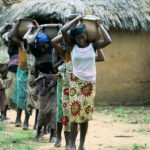African Development Bank’s (AfDB) latest economic report for West Africa poses more concern for the region, which is already plagued by multiple crises.
Development Diaries reports that AfDB, in its 2023 West Africa Economic Outlook report, revealed that the region experienced slower economic growth in 2023, with the exception of Cape Verde, The Gambia, Guinea, Mali, and Niger.
The report assessed economic performance of 15 West African countries: Benin, Burkina Faso, Cape Verde, Côte d’Ivoire, The Gambia, Ghana, Guinea, Guinea-Bissau, Liberia, Mali, Niger, Nigeria, Senegal, Sierra Leone and Togo.
‘The report provides key economic trends in 2022 as well as medium-term (2023 to 2024) economic forecasts for the region’, an AfDB statement read.
‘It also evaluates strategies to accelerate the mobilisation of private sector financing for climate and green growth in West Africa’.
Findings show that West Africa’s average gross domestic product (GDP) decelerated to 3.8 percent in 2022 from 4.4 percent in 2021.
This implies that growth recovery from the 2020 downturn had slowed.
In fact, the World Food Programme (WFP), in July 2023, revealed that food insecurity across West and Central Africa had hit a ten-year-high.
However, the bank said adapting to climate change and depletion of the region’s natural resources presented an opening for businesses and governments to embrace sustainable green growth.
Currently, the Economic Community of West African States (ECOWAS) has its hands full trying to maintain peace, security and development in the region.
ECOWAS, which is an economic-focused body, has been distracted in responding to conflicts in the region, shifting its focus away from the original agenda of commerce and economic cooperation.
Development Diaries calls on ECOWAS to also prioritise issues of economic growth by strengthening policies to boost the region’s economy.
Photo source: WFP





